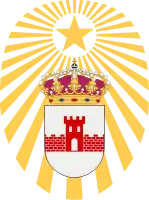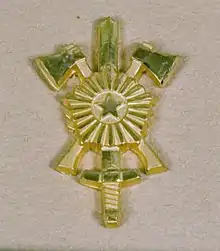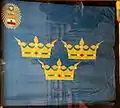Norrland Engineer Battalion
The Norrland Engineer Battalion (Swedish: Norrlands ingenjörbataljon), designation Ingbat/I 19, originally Boden Engineer Regiment (Swedish: Bodens ingenjörkår), designation Ing 3, was a Swedish Army engineer unit, one of the few new formations raised in the 20th century. It was disbanded in 2005. The unit was garrisoned in Boden, Sweden.
| Norrland Engineer Battalion | |
|---|---|
| Norrlands ingenjörbataljon | |
 | |
| Active | 1905–2004 |
| Country | |
| Allegiance | Swedish Armed Forces |
| Branch | Swedish Army |
| Type | Engineer |
| Size | Battalion |
| Part of | VI Army Divisoon (1902–1927) Upper Norrland's Troops (1928–1942) VI Military District (1942–1966) Upper Norrland Military District (1966–1993) Northern Military District (1993–2000) Norrbotten Regiment (2000–2004) |
| Garrison/HQ | Boden |
| Motto(s) | Nos nihil efficere non possumus ("Here are no impossibilities") |
| Colors | Black |
| March | "Bodens ingenjörkårs marsch" (Widqvist)[note 1] |
| Anniversaries | 24 October[note 2] |
| Insignia | |
| Branch insignia |  |
| Cap badge |  |
| Shoulder sleeve insignia |  |
History
The unit has its origins in the engineer companies created at Norrbotten Regiment in 1902. These companies became independent in 1904 as Boden Engineer Corps and gained the designation Ing 4 (4th Engineer Regiment). Boden Engineer Corps gained the new designation Ing 3 in 1937 and was upgraded to a regiment in 1975 and was renamed Boden Engineer Regiment.
It was then downgraded to a battalion unit again in 1994, and was renamed Norrland Engineer Corps. In 2000, the battalion became one of five battalions in Norrbotten Regiment, with the name Norrland Engineer Battalion, the designation Ing 3 was not kept, even though it was still in common use. The battalion was disbanded in 2005.
Campaigns
- None
Organisation
- ?
Heraldry and traditions
Colours, standards and guidons
At the 300th anniversary of the Fortifikationen ("Royal Engineers") on 26 September 1935, His Majesty the King Gustav V presented a colour to the then Boden Engineer Corps.[2] On 1 January 1998, the colour of Svea Engineer Corps was transferred to Norrland Engineer Corps after Svea Engineer Corps was disbanded on 31 December 1997.[3] A new colour was presented to the then Norrland Engineer Battalion in Boden by His Majesty the King Carl XVI Gustaf on 27 August 2001. It was drawn by Kristina Holmgård-Åkerberg and embroidered by machine and hand (the badge) in insertion technique by the company Libraria. The colour may be used according to the decisions of CO I 19. Blazon: "On blue cloth in the centre the lesser coat of arms of Sweden, three yellow crowns placed two and one. In the first corner a mullet with a cluster of rays, all in yellow. In the lower part of this the coat of arms of the unit; argent, throughout a wall with a gatetower both embattled gules (the original name of the battalion was Royal Boden Engineers Regiment, Ing 3); on a chief azure three open crowns in fess or (a legacy from the former Svea Engineer Regiment, Ing 1). The shield ensigned with a royal crown proper.[4] After the battalion was disbanded, the colour was carried by Norrland Engineer Company at Norrbotten Regiment until the company was disbanded on 21 June 2011.[3]
 2001 colour
2001 colour
Coat of arms
The coat of the arms of the Boden Engineer Regiment (Ing 3) 1977–1994, the Norrland Engineer Corps (Ing 3) 1994–2000 and the Norrland Engineer Battalion (Ingbat/I 19) 2000–2004. Blazon: "Argent, the town badge of Boden, a wall throughout embattled gules with a gatetower, mansoned in the first colour. The shield surmounted a cluster of rays coming down from a mullet, or".[5]
Medals
Prior to the disbandment on 30 June 2000, the Norrlands ingenjörkårs (Ing 3) minnesmedalj ("Norrland Engineer Corps (Ing 3) Commemorative Medal") in silver (NorrlingSMM) of the 8th size was established. The medal ribbon was divided in black, blue and black moiré.[6] Prior to the disbandment of the battalion on 26 August 2005, the Norrlands ingenjörbataljons minnesmedalj ("Norrland Engineer Battalion Commemorative Medal") in silver (NorrlingbatMSM) of the 8th size was established. The medal ribbon was black with blue edges followed by a yellow stripe.[7]
Commanding officers
Regimental commander as well as battalion and corps commander from 1905 to 2005. Commanding officers from 1905 to 1973 and from 1994 to 2000 were called "corps commander". Commanding officers from 1973 to 1994 were called "regimental commander" and from 2000 to 2005 the commanding officers were called "battalion commander".
- 1905–1907: Emil Sebastian von Krusenstjerna
- 1907–1914: Olof Kullberg
- 1914–1916: Henri Leopold de Champs
- 1916–1920: Axel Norinder
- 1920–1926: Per Albin Dihlström
- 1926–1928: Ove Sylvan
- 1928–1931: Sven Alin
- 1931–1934: Ebbe Tydén
- 1934–1937: Gunnar Ström
- 1937–1940: Åke Grönhagen
- 1940–1941: Inge Hellgren
- 1941–1941: Anders Walter Graûmann
- 1941–1948: Wilhelm Dahlgren
- 1948–1953: Stig Berggren
- 1953–1959: Nils Rabe
- 1959–1973: Tore Rahmqvist
- 1973–1979: Owe Karl-Gösta Dahl
- 1979–1982: Hans Carlsson
- 1982–1983: Karl Oskar Sigurd Henningsson (acting)
- 1983–1991: Karl Oscar Bertil Alm
- 1991–1993: Sören Stegius
- 1994–1994: Anders Andersson (acting)
- 1994–1996: Jan-Gunnar Isberg
- 1996–1998: Bo Sören Ericson
- 1998–2000: Gunnar Söderström
- 2000–2002: Roger Olsson
- 2002–2004: Anders Widuss
- 2004–2005: Björn Sundström
Names, designations and locations
| Name | Translation | From | To | |
|---|---|---|---|---|
| Kungliga Bodens ingenjörkår | Royal Boden Engineer Corps | 1905-04-01 | – | 1974-12-31 |
| Bodens ingenjörkår | Boden Engineer Corps | 1975-01-01 | – | 1975-06-30 |
| Bodens ingenjörregemente | Boden Engineer Regiment | 1975-07-01 | – | 1994-06-30 |
| Norrlands ingenjörkår | Norrland Engineer Corps | 1994-07-01 | – | 2000-06-30 |
| Norrlands ingenjörbataljon | Norrland Engineer Battalion | 2000-07-01 | – | 2004-12-31 |
| Avvecklingsorganisation | Decommissioning Organisation | 2005-01-01 | – | 2005-08-31 |
| Norrlands ingenjörkompani | Norrland Engineer Company | 2005-09-01 | – | 2011-12-31 |
| Designation | From | To | ||
| Ing 4 | 1905-04-01 | – | 1937-06-30 | |
| Ing 3 | 1937-07-01 | – | 2000-06-30 | |
| Ingbat/I 19 | 2000-07-01 | – | 2005-08-31 | |
| Ingkomp/I 19 | 2005-09-01 | – | 2011-12-31 | |
| Location | From | To | ||
| Luleå/Notviken | 1902-05-12 | – | 1904-05-01 | |
| Boden Garrison | 1904-04-01 | – | 2011-12-31 |
See also
Footnotes
- The march was adopted on 25 September 1922 and was established in 1953 by Army Order 33/1953.[1]
- In memory of the Lake Armasjärvi disaster on 24 October 1940.
References
Notes
- Sandberg 2007, p. 27
- Braunstein 2003, pp. 255–257
- "Fanor" [Colours]. www.ing3kf.com (in Swedish). Retrieved 10 October 2018.
- Braunstein 2004, p. 48
- Braunstein 2006, p. 36
- Braunstein 2007, p. 113
- Braunstein 2007, p. 124
Print
- Braunstein, Christian (2003). Sveriges arméförband under 1900-talet. Skrift / Statens försvarshistoriska museer, 1101-7023 ; 5 (in Swedish). Stockholm: Statens försvarshistoriska museer. ISBN 91-971584-4-5. SELIBR 8902928.
- Braunstein, Christian (2004). Svenska försvarsmaktens fälttecken efter millennieskiftet [The flags and standards of the Swedish armed forces after the turn of the millennium] (PDF). Skrift / Statens försvarshistoriska museer, 1101-7023 ; 7 [dvs 8] (in Swedish). Stockholm: Statens försvarshistoriska museer. ISBN 91-971584-7-X. SELIBR 9815350. Archived from the original (PDF) on 2018-05-22. Retrieved 2018-10-10.
- Braunstein, Christian (2006). Heraldiska vapen inom det svenska försvaret [Heraldry of the Swedish Armed Forces] (PDF). Skrift / Statens försvarshistoriska museer, 1101-7023 ; 9 (in Swedish). Stockholm: Statens försvarshistoriska museer. ISBN 91-971584-9-6. SELIBR 10099224.
- Braunstein, Christian (2007). Utmärkelsetecken på militära uniformer [Decorations on Swedish military uniforms] (PDF). Skrift / Statens försvarshistoriska museer, 1101-7023 ; 12 (in Swedish). Stockholm: Statens försvarshistoriska museer. ISBN 978-91-976220-2-8. SELIBR 10423295.
- Sandberg, Bo (2007). Försvarets marscher och signaler förr och nu: marscher antagna av svenska militära förband, skolor och staber samt igenkännings-, tjänstgörings- och exercissignaler (in Swedish) (New ed.). Stockholm: Militärmusiksamfundet med Svenskt marscharkiv. ISBN 978-91-631-8699-8. SELIBR 10413065.